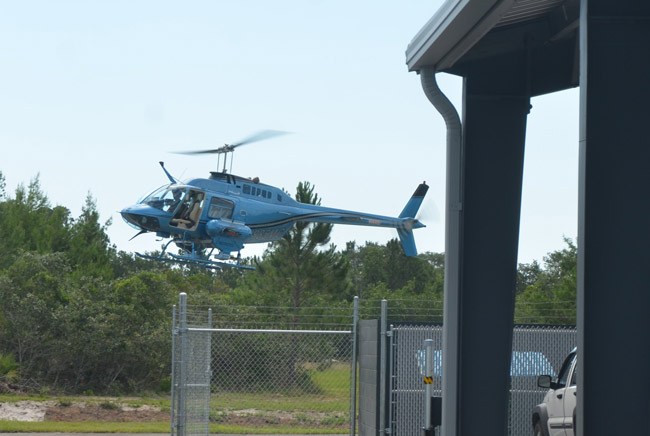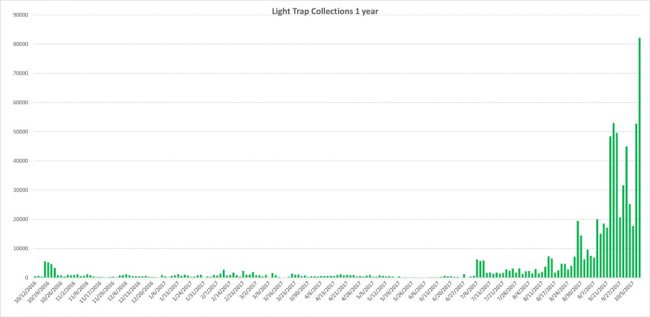
Torrential rains from Hurricane Irma and the nor’easter that closely followed with even heavier rains has left Flagler County stagnating in water and facing a record surge of mosquitoes not seen in the East Flagler Control District’s 65-year history, the district’s director said Wednesday.
“We’ve never had this many mosquitoes per day as we’ve had now,” Mark Positano, the district’s director, said. The district’s weekly mosquito census shows the surge, first starting in late August, abating for a few weeks, then spiking a few days after Irma, when swarms were already at near-intolerable levels, then surging again, almost double the levels after Irma, following the two days of rain 10 days ago that left parts of the county soaking from 14 inches.
Mosquitoes bred from those waters are just now taking flight.
The district is planning renewed pesticide bombardments from the air, using its helicopter, starting at midnight Thursday and going north from Flagler Beach to just south of Marineland. Subsequent nights will treat sections further west. It’ll take three days to treat the whole district, which does not include the west side of the county, though the county administration is seeking help again from the state to increase the areas to be sprayed.
“We had the first aerial spraying September 22 and 23 with the help of the state, and we need to have a second countywide bombardment,” County Administrator Craig Coffey said. That first spraying, which took place before the second major rains, covered 108,000 acres, cost $340,000, and was carried out with two contracted plans, most of it paid (eventually) by the Federal Emergency Management Administration, though Flagler County’s portion of the bill is still going to be $42,000, over and above what the Mosquito District itself pays for spraying. The district is a tax-supported agency with its own annual budget of over $1.2 million.
[Update: on Thursday, the county administration “recalled” a release it had issued the previous day, with Coffey’s statement. Positano explained: “When I heard from the Aerial contractor their information was the state was not going to do anymore operations to control mosquitoes. I have not heard that from the Department of Agriculture officially yet and Craig has not said either way if the state emergency operations center has done anything with the request as of yet.” He said he hoped “that the state would consider the second round of flooding as an extension of the Hurricane’s effect and respond accordingly to this threat to public health.”]
The district’s helicopter will go airborne at midnight Thursday, but its trucks are out every night spraying. Truck-spraying is less efficient than air spraying because it can’t reach as deeply and sweepingly as bombardment by air. “The trucks have been out will continue to be out and we’ll keep running them until we can get on top of them but the helicopter is the big gun, it can get into a lot of areas where the trucks can’t,” Positano said.

Meanwhile mosquitoes have made conditions “unbearable,” especially for people who live anywhere near salt marshes, where this kind of floodwater mosquito thrives. “They’ll bite you during the day, they’ll bite you at night,” Positano said. “Until we can get on top of them they’re going to be pretty bad.”
Floodwater mosquitoes are more aggressive and can fly up to 20 miles in a night, so they can travel north from Volusia or south from St. Johns to make life miserable for Flagler residents.
As for the district’s cash flow: it’s not a problem at the moment even though the operation is “at our max right now,” Positano said. The district is in a new budget year, so it’s stocked with chemical supplies, it has a $200,000 cash reserve and $200,000 in contingency funding. The district’s financial health is an issue because it’s coming off a budget year when it discovered that it had overspent some $1.3 million, in essence wiping out most of its reserves, after what district officials described as an accounting error. But those issues are not affecting the ongoing mosquito control response.





























Lou says
For the first time in 17 years, I got bit by a mosquito.
I hope there is an audit trail for the spraying that is available to the taxpayers.
And the board have to rebuild the much needed credibility.
Steven says
Lying bastards! Those trucks have ONLY been out once ( in my area )since Irma and believe me, I know when I hear them coming around my neighborhood! That was 4 days ago. Still waiting for more spraying!
r&r says
If Coffey and the county commisioners responsible for this financial problem had any responsibility toward there job should be the ones that should fix it.
Nancy W says
With the amount of standing water in my community I am amazed that the problem isn’t worse. The pumps are pumping water from under houses day and night. This has become a nightmare.
tulip says
I have always thought mosquito control did a great job, now they are doing an exceptional job in winning the battle against those little biters are not going to ever see the light of day or enjoy a snack from a human body.
Keep up the good work.
tulip says
If you call mosquito control and request they come and spray your area, they will.
palmcoaster says
They better spray and use our taxes for what are intended…spraying, not lush accommodations! What is going on with this people what about some fiduciary obligation to us the taxpayers?
Ann Corsitto says
What chemicals are they spraying with? Is it safe to animals and humans?